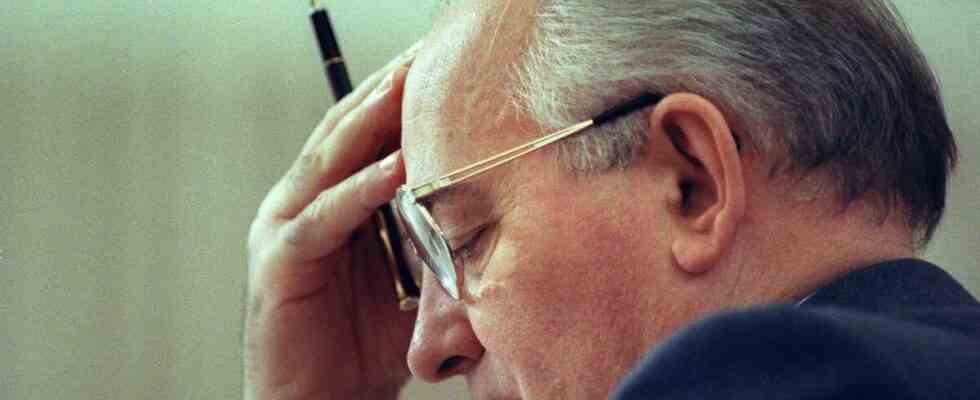Unlike the rest of the world where he enjoys immense respect, in Russia bitterness tends to dominate when the name of Mikhail Gorbachev is mentioned. Pure product of the communist system, the former leader, who died Tuesday at the age of 91, probably did not imagine that he would change the face of the world by becoming the involuntary gravedigger of the USSR.
Simple son of a peasant, he followed a classic course of apparatchik to become at the age of 54, on March 11, 1985, the number one of a Soviet empire then bloodless on the economic level and which was entangled in an endless war in Afghanistan. .
“Perestroika” and “glasnost”
His youth sets him apart. In less than three years, since the death of Leonid Brezhnev in 1982, the Soviet CP has known two aging general secretaries who died in this post, Yuri Andropov and Konstantin Tchernenko. Conscious that the crisis lurks, Gorbachev launches a liberalization baptized “perestroika” (restructuring) and “glasnost” (transparency) to reform the Soviet system and reduce the influence of the old caciques of the party.
Millions of Soviets then discovered unprecedented freedoms, but also shortages, economic chaos and nationalist revolts that would sound the death knell of the USSR, for which many of his compatriots would never forgive him. “Of course, I have regrets, big mistakes were made,” he said in January 2011.
Because under his mandate, there was no lack of excesses: the entry of Soviet tanks into Lithuania, the repression of peaceful demonstrators in Georgia, or the Chernobyl nuclear disaster in 1986, passed over in silence for days, contributing to the contamination of hundreds of thousands of people.
“A man you can deal with”
In the West, whether it is the German Chancellor Helmut Kohl or the American President Ronald Reagan, the leaders of the capitalist world are on the other hand fascinated by this new interlocutor open to negotiation. “He’s a man you can deal with,” British Prime Minister Margaret Thatcher said of him. Nuclear disarmament agreement, refusal to intervene militarily to defend the Iron Curtain, withdrawal of the Red Army from Afghanistan: the Soviet number one is decidedly different. This respect will never disappear in the West because of its restraint when the Berlin Wall and the communist regimes of Czechoslovakia, Hungary and Poland crumbled. He will be awarded a Nobel Peace Prize in 1990.
But for the Russians, Gorbachev has destroyed their homeland’s great power status, and they have nothing but disdain for this poor orator with a drawling accent from his native region of Stavropol. His fall, moreover, has an air of humiliation. In June 1991, when Boris Yeltsin was elected President of Soviet Russia by universal suffrage, Gorbachev tried to save the USSR by proposing greater internal autonomy. The project collapsed on August 19, 1991, when the hard line Communist Party attempted a putsch against him. Above all it is his sworn enemy, Boris Yeltsin, who will be the hero of the resistance to this failed coup. Already dying, the USSR disappeared in December when Russia, Belarus and Ukraine proclaimed that the Soviet Union “no longer exists”. Mikhail Gorbachev resigns on December 25.
0.5% in the 1996 presidential election
Since leaving power, Mikhail Gorbachev had become a herald of the environmental cause and had created a foundation already named after him, dedicated to socio-economic studies. In 1996, he ran for president against Boris Yeltsin, but only won 0.5% of the vote.
Increasingly discreet in recent years as his health declined, he admitted certain wrongs. A virulent time against Vladimir Putin, saying in 2011 his “shame” to have supported him at the turn of the 2000s, he increasingly directs his criticisms against Westerners from the annexation of the Crimean peninsula in 2014 by Russia and multiplies warnings of the advent of a new Cold War.
In February 2019, he denounced the American decision to withdraw from the INF treaty on intermediate-range weapons, which he had signed with Ronald Reagan in 1987. Finally, before his death, he had not spoken publicly about the massive Kremlin offensive in Ukraine.

